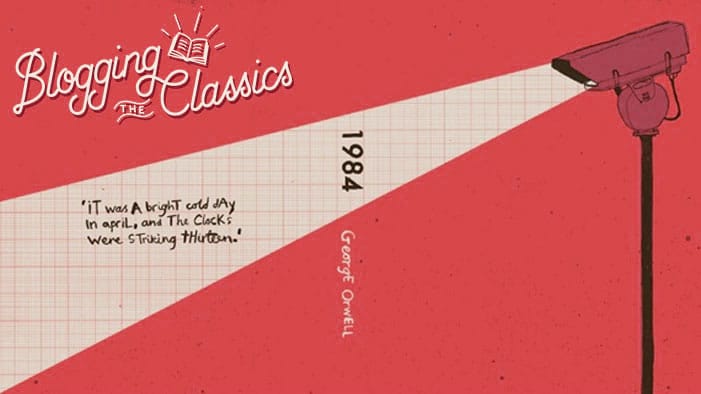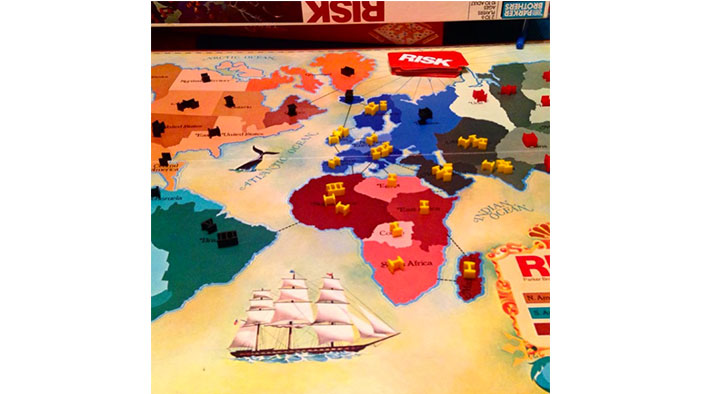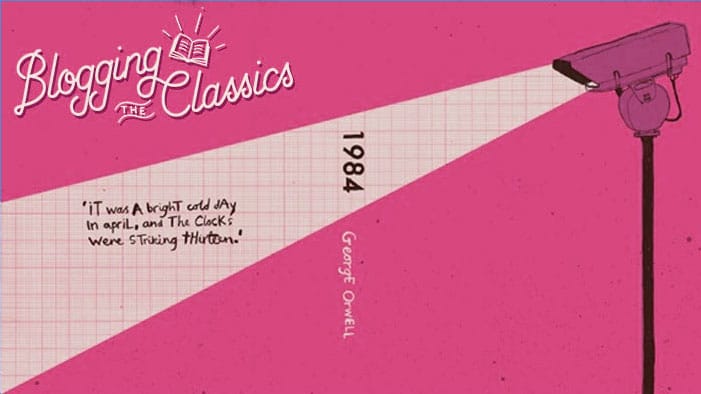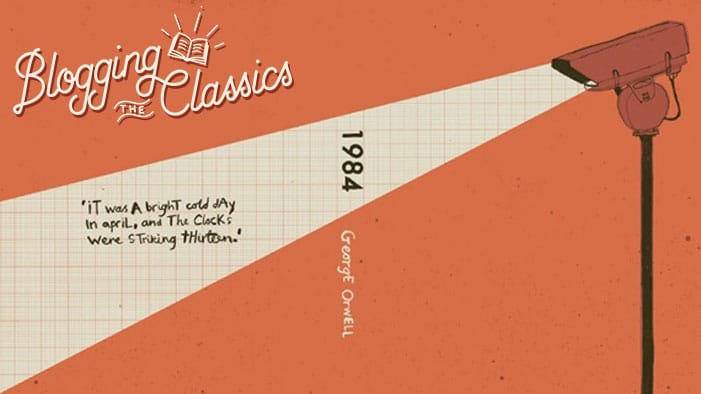Blogging 1984: VIII, SparkNoting Goldstein’s Book (Part 2, Chapter 9)

Previously in Blogging 1984, Winston brought Julia along to his rendezvous at O’Brien’s, wine was had, kind Mongolian comrades were subtly insulted, and I had a very bad feeling about it all.
In the aftermath, “Winston was gelatinous with fatigue.”
Gelatinous?
“Gelatinous was the right word.”
Sure.
We learn that Hate Week has hummed along as smoothly as the 2016 Brazil Olympics, if you ignore the decision by Big Brother to announce part-way through that they were, and had always been, at war with Eastasia, not Eurasia. This naturally came as a surprise to the crowd, who had been hard at work preparing the anti-Eurasia bunting for weeks:
“The banners and posters with which the square was decorated were all wrong! … It was sabotage! The agents of Goldstein had been at work! There was a riotous interlude while posters were ripped from the walls, banners torn to shreds and trampled underfoot.”
Before you judge the collective mindset capable of such an agile delusion, ask yourself: Are we currently at war with:
a) Taylor Swift, or
b) anti-Swiftian forces?
?
?
The point is there is no real way to know, and in the end it matters very little, so long as we can be goaded into raising our heads up from our tiny lives to gape at the same bright light once in a while. Julia actually gets this better than Winston. Anyhow, the tweak to the war narrative has created a wealth of busywork—it’s a bit like FDR’s New Deal, if Franklin’s plan to put the nation to work involved doctoring history to remove all traces of a war with Eurasia and rush-deliver some Pornosec literature instead of building roads.
And Winston is off to Mr Charrington’s shop with his verrry contraband copy of Goldstein’s book (emphasis George’s) inside his briefcase. Goldstein’s book is, I’m warning you, kind of like the time your mom gave you “the Talk,” in that you find yourself listening to an account of how the world’s sausage is made in frightening detail such that you never asked for.
***Herein I promise that if you want to skip 30 pages of Goldstein, this blog will honestly suffice***
The title page reads:
THE THEORY AND PRACTICE OF OLIGARCHICAL COLLECTIVISM
By Emmanuel Goldstein
Chapter One is titled “Ignorance is Strength” and explains that the world is made up of the High, the Middle, and the Low—groups whose aims are “entirely irreconcilable.” Throughout history, these groups have been known by different names (e.g., upper class = the aristocracy, the 1%, people who can afford to do gyrotonics; the middle class = the bourgeois, white-collar workers, people who watch The Great British Bake-Off; and the low = working class/District 12) but the dynamic is always the same: jostling for/against social mobility, depending on where you fall on the social totem pole.
Chapter Three is called “War is Peace” and explains the new world order, in which three super states have risen like freaky phoenixes from the ashes of 20th century geopolitics to be ever at war with each other:
Oceania (the American continent, the UK, and Australia); world leader in production of Hemsworths/Chrises
Eurasia (Mongolia, Russia, Europe, and north Africa); the only place you can get a real croissant
Eastasia (East Asia and sub-Saharan Africa); abundant beet soup
Here’s a world map of Orwell’s 1984:

Oceania is in the middle, obvs; Eurasia at right.
In short, dissolving national borders and creating giant closed-market systems was a net positive for production, and overall reduced the amount of conflict in the world, bar the border zones where skirmishes continue. Donald Rumsfeld would call it a stable disequilibrium, or something, probably. I simply think of it like a game of Risk with three players that might just go on forever until someone tips over the game board in frustration (aka the nuclear option).

War is, as Goldstein explains:
“of limited aims between combatants who are unable to destroy one another, have no material cause for fighting and are not divided by any genuine ideological difference.”
At the same time, war hysteria is “continuous and universal,” creating the perfect conditions for raping, looting, the slaughter of children, and the boiling of prisoners to become the status quo in each state.
Those who live in the liminal quadrilateral between Darwin, Hong Kong, Tangier, and Brazzaville are slaves who find that their colonizers change occasionally without affecting their level of misery for better or worse.
If these super states are able to be self-sufficient, then why even fight the other countries, you might be asking. Why not just bask in endless maple-bacon donuts and live in a state of perpetual Coachella?
WELLLL, (gets out diagram of the male anatomy):
“it was clear that an all-round increase in wealth threatened the destruction—indeed, in some sense was the destruction—of a hierarchical society… But in practice, such a society could not long remain stable.”
The TL;DR of this chapter is that keeping the population in a state of disenfranchisement (i.e., by blowing up goods and labor through war) fosters competition between the classes, thus maintaining the social order: “the possession of a lump of horseflesh makes the difference between wealth and poverty.” This is, coincidentally, the same mentality behind dangling ever-more-scant “teaser trailers” before a hungry public (I will henceforth be referring to all teaser trailers as horseflesh).
For your study notes/bonus points: The three philosophies pushed by the super states are Ingsoc (Oceania), neo-Bolshevism (Eurasia), and Death-Worship or “Obliteration of the Self” (Eastasia). These philosophies keep citizens unmoored, intellectually:
“the citizen of Oceania is like a man in interstellar space, who has no way of knowing which direction is up and which is down.”
Julia enters the room, and, after a bit of woo-woo in the antique bed, Winston begins reading the book aloud to her, starting with Chapter One and the classes. The middle class aspires to overthrow and replace the upper class, the upper class works to prevent this from happening, and the working class seeks to dismantle the system entirely; these dirty masses the only proven engine of revolution. Ultimately, through season after season of Kardashian-related reality, nothing changes:
“The idea of an earthly paradise in which men should live together in a state of brotherhood, without laws and without brute labor, had haunted the human imagination for thousands of years.”
(Good news, you guys, the Cold War is over and this paradise actually exists right now today in Woodstock, NY.)
Back to Goldstein’s book, we take a little dip into Marxism as he explains the process by which a society goes from capitalism to socialism, and finally totalitarianism. He goes on to explain the importance of doublethink in preserving the system:
“If human equality is to be for ever averted—if the High, as we have called them, are to keep their places permanently—then the prevailing mental condition must be controlled insanity.”
Hence the forms of mind control and social stratification you see in all three nation-states, each of which have nuclear arms, it’s important to note—existentially, they fight these petty border wars to distract their populace and prevent either a) total annihilation by A-bomb, or b) progress to stage four of Marxism, Utopia! Further, the creation of Big Brother, no more likely a real person than Banksy, is revealed to be a masterstroke of misdirection, drawing the eye of the masses to focus their love and hatred on something human, rather than draw back the curtain on the sprawling bureaucracy of the Party. For this reason, there is no real chance of ever defeating the system, the book concludes in Chapter Three, and I would kind of like to see a table of contents right about now, because where do you go from there to keep the reader’s interest?
Winston is just about to learn the central motive behind Big Brother when he realizes Julia is asleep, and closes the book a literal page from the thrilling conclusion.
Regardless of the Ultimate Truth about Big Brother, Winston at this point thinks he knows enough to feel relieved, enlightened, reassured:
“He was safe, everything was all right. He fell asleep murmuring ‘Sanity is not statistical,’ with the feeling that this remark contained in it a profound wisdom.”
Oh, Winston. :/
Notes:
- Points to Julia for being right about pretty much everything (who you are war with doesn’t matter; Big Brother is probs not even real), but being low-key politically evolved.
- I feel like writing George Orwell a letter from the future, like, “George! You don’t need to worry! Mostly things worked out, and you wouldn’t believe the things you can get on this independent marketplace called Etsy. For real, baby tattoos are just one facet of this wonderful new economy <3 <3 <3.”
- Your weekly glimpse of actual 1984—GET IT, BRUCE:
Find all of Janet’s 1984 blog here, and find our Blogging the Classics index page here.
Images (unless otherwise attributed): Lionsgate; SparkNotes; Imgflip/YouTube/Weinstein Company; Imgflip/YouTube/Henson Company















